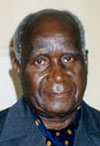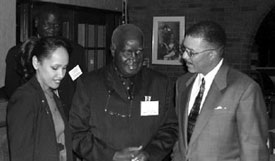President Kenneth Kaunda speaks to Black journalists
By Askia MuhammadWhite House Correspondent | Last updated: Nov 18, 2003 - 8:07:00 AM
What's your opinion on this article?

Dr. Kenneth Kaunda
|
NASHVILLE (FinalCall.com) - Blacks in the United States should not "demonize" Zimbabwe’s President Robert Mugabe, but should work, as do other groups who migrated to this country, to develop both a home in America, and their homeland in Africa, according to Dr. Kenneth Kaunda, the founding president of Zambia, one of Sub-Saharan Africa’s first independent countries.
Earlier this year, two of this country’s leading Africa-interest activists loudly criticized Mr. Mugabe for taking land from White farmers without compensating them and redistributing it among landless Black war veterans. But Mr. Mugabe deserves a fairer hearing, Dr. Kaunda, whose own country borders Zimbabwe, told members of the Trotter Group of Black newspaper columnists and commentators Oct. 22, during their annual meeting here.

Dr. Kaunda with journalists at the Trotter annual meeting on Oct. 22.
|
"Our brothers and sisters in the West have been working hard to demonize Mugabe," said Dr. Kaunda, the first Balfour African President-in-Residence at Boston University’s African Presidential Archives and Research Center, in response to a question.
"I’ve said this several times. When you see what Ian Douglas Smith did in Zimbabwe, he arrested Mugabe and all others. He threw them into prison for over 10 years," said Dr. Kaunda of Mr. Smith, who led the White settlers in what was called Southern Rhodesia to declare independence from Britain in 1965 in order to establish a White-minority government.
"Now, when independence came (in 1981), I personally expected that Mugabe would arrest Ian Smith and punish him for his sins. Mugabe did not do that. He said: ‘Let bygones be bygones. Let us all start afresh.’ Now, a man who is able to do that for a man who imprisoned him for nothing is really a very good man."
Zimbabwe faced major problems, and things "got complicated and we got into this mess now," according to Dr. Kaunda. Those problems got worse when the British reneged on their agreement to compensate White farmers for land confiscated by the Zimbabwe government.
"We should not demonize Mugabe at all. That man, in my opinion, forgave the unforgivable. It means that he has a good heart. Those who want to help Mugabe should talk to him about what they think is going wrong, instead of demonizing him. He has done great things, made mistakes no doubt, but what do you expect?"
After Pres. Kaunda’s electoral defeat in his country’s 1991 presidential election, he formed the Kenneth Kaunda Peace Foundation, dedicated to the establishment of peace and conflict resolution, and to fighting HIV/AIDS and poverty in Africa.
But while he was president for more than 25 years, the plight of Africa got mixed reactions from leaders in Washington. "I used to come here every time there was a new president to talk about African problems," he recalled. "One day, I came to talk to Ronald Reagan. I spent 90 minutes talking, talking, talking, about apartheid and problems. I am hoping that my host will now tell me how he is going to help us. He says: ‘Can we start talking about how we can trade together?’ I was very disappointed."
That attitude, he said, is why Africa receives such small amounts of financial assistance from the U.S. "They gave us here and there, little by little, but definitely nothing to speak of." The countries which helped were the Scandinavian countries and China.
"Our Chinese brothers and sisters agreed to help us. You know why? They understood us. The Chinese never forgot how we helped them and when we appealed to them, they came."
After 70 years of British colonial domination, his country became independent with only 100 college graduates, only three of them medical doctors. "When we took over, we built primary schools all over the country. We built colleges, trained nurses."
By the time Dr. Kaunda left office, Zambia had more than 55,000 college graduates among its population of 9.5 million people. And, he said, while AIDS has taken some of the young generation of potential leaders away, others have fled because of bad governance. Now, he said, Blacks in this country, along with Africans, "must attack this problem from both sides. From within America and from within Africa, together, together."
Dr. Kaunda calls his home country, along with Ghana, Malawi, Mali, Benin, Nigeria, Mozambique, South Africa, Tanzania, and others, "anchor states," because of their commitment to democratization and free market reform.
"I have been saying here ever since I came (to the Boston University Residency) that I have stopped talking about Africans going back to Africa. I am saying, now we must do what others are doing. The British are here, whether they are English, Scottish, Welsh, Irish. The Irish are here. There are more here in America than in their country of origin," in some cases, he said. "Israelis, Indians, Japanese. I am saying: Your home is here. Come and make homes in Africa. Both places, here and in Africa.
"Don’t allow others to come and exploit your natural resources. Organize our people. You help yourselves here, your people there."
The "winds of change" are sweeping across the African continent, Dr. Kaunda said, and the rapid changes now require "scholarly and journalistic" inquiry from Blacks residing both on the African continent and in the U.S.
"The point I wish to emphasize is that while the abundance of Africa’s natural resources is legendary, Africa’s economic value is more than the total of Mother Nature’s blessings," he said. And the challenges facing the continent are more than the total of its problems. There are, he insisted, "opportunities to be found and money to be made" in Africa.
Descendants of Africa throughout the Diaspora must "rise and shine," he declared, moving "forward ever and backward never."
INSIDE STORIES AND REVIEWS
-
-
About Harriett ... and the Negro Hollywood Road Show
By Rabiah Muhammad, Guest Columnist » Full Story -
Skepticism greets Jay-Z, NFL talk of inspiring change
By Bryan 18X Crawford and Richard B. Muhammad The Final Call Newspaper @TheFinalCall » Full Story -
The painful problem of Black girls and suicide
By Charlene Muhammad -National Correspondent- » Full Story -
Exploitation of Innocence - Report: Perceptions, policies hurting Black girls
By Charlene Muhammad -National Correspondent- » Full Story -
Big Ballin: Big ideas fuel a father’s Big Baller Brand and brash business sense
By Bryan Crawford -Contributing Writer- » Full Story






 Click Here Stay Connected!
Click Here Stay Connected!








